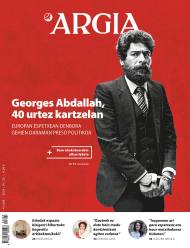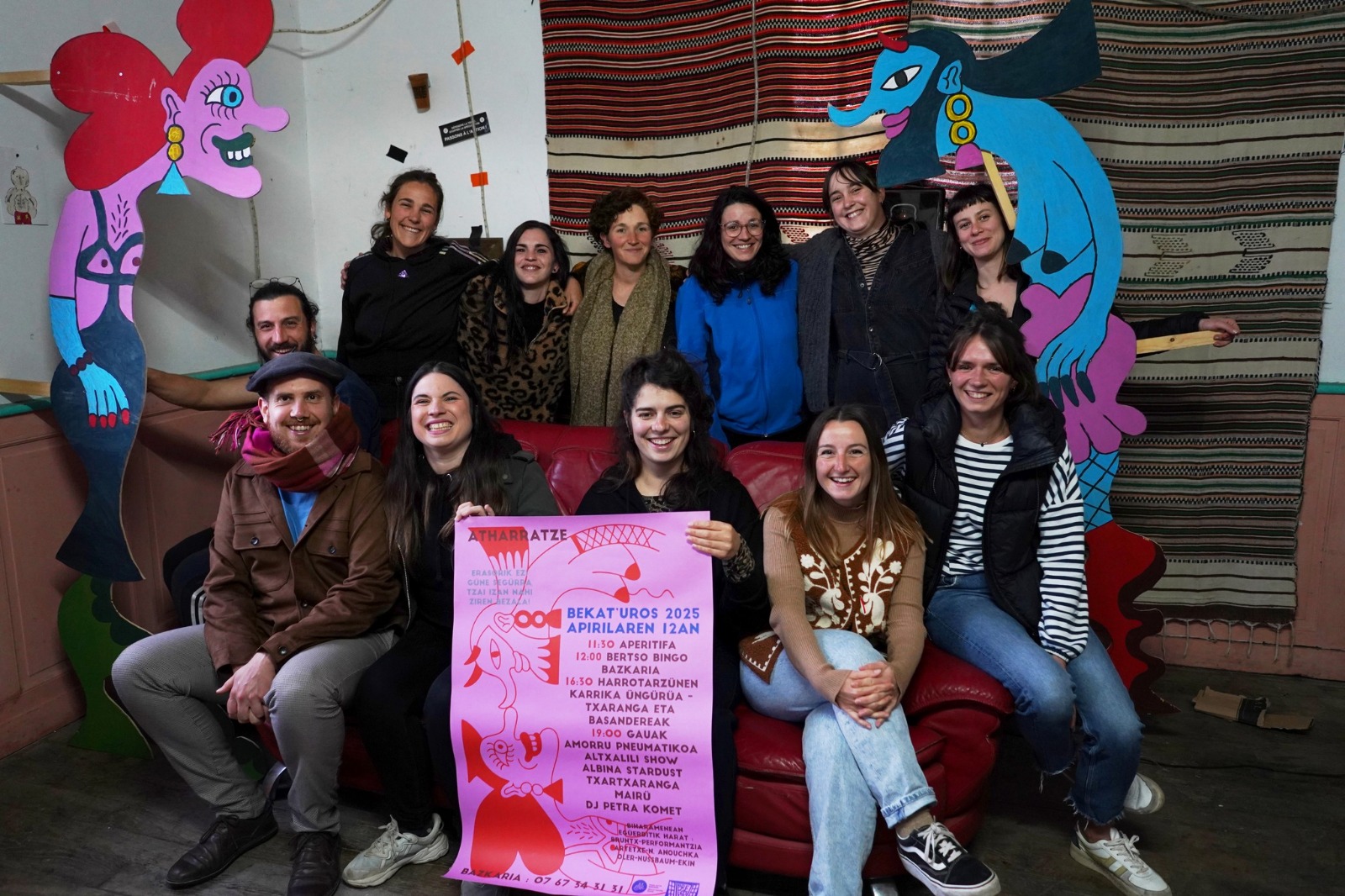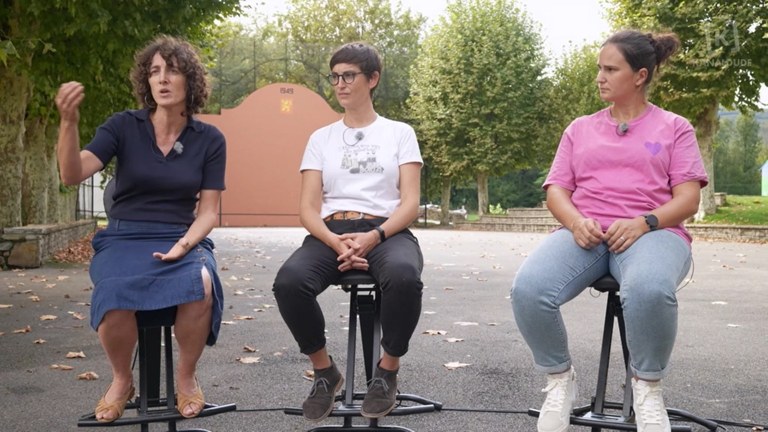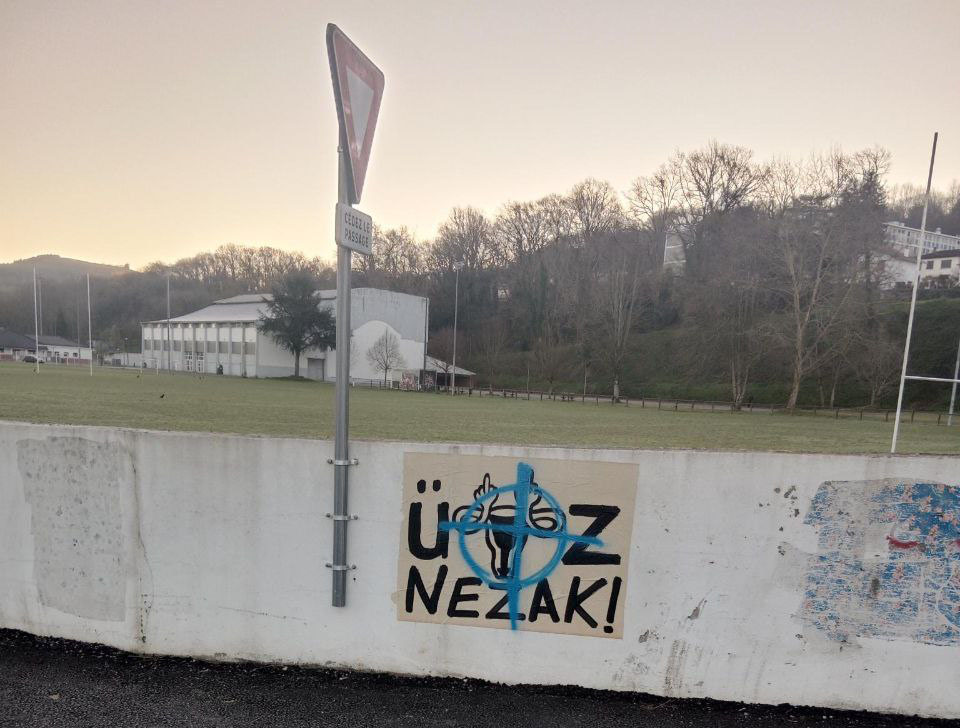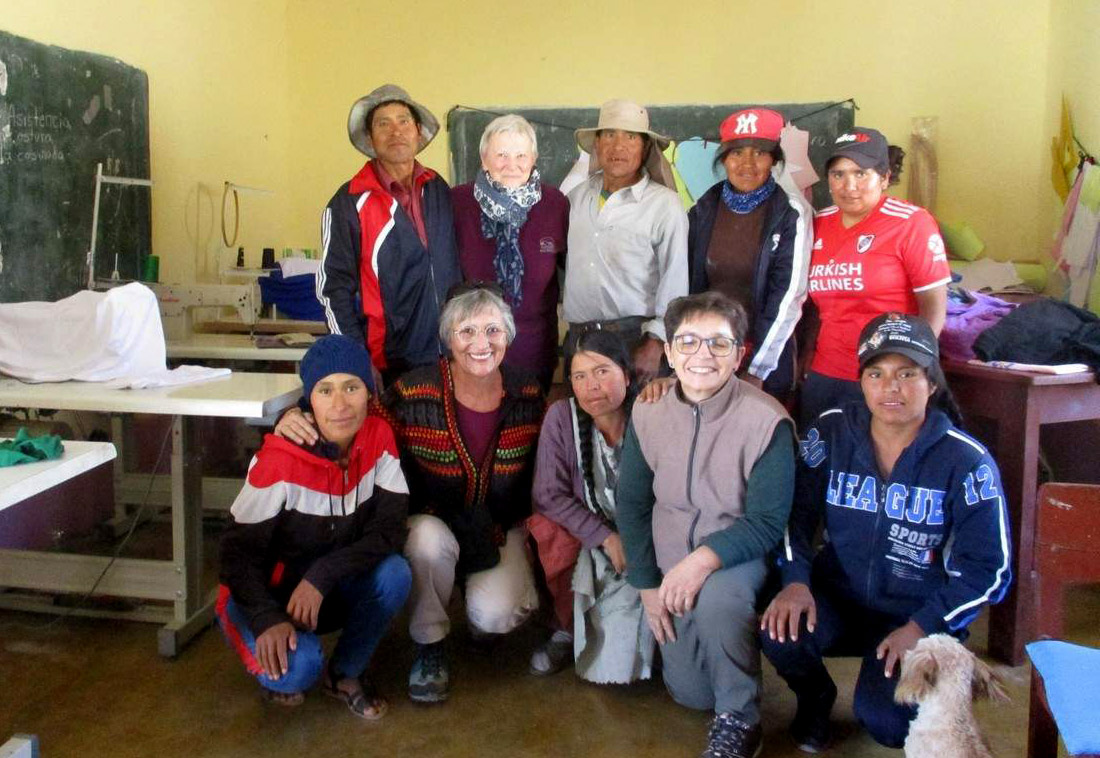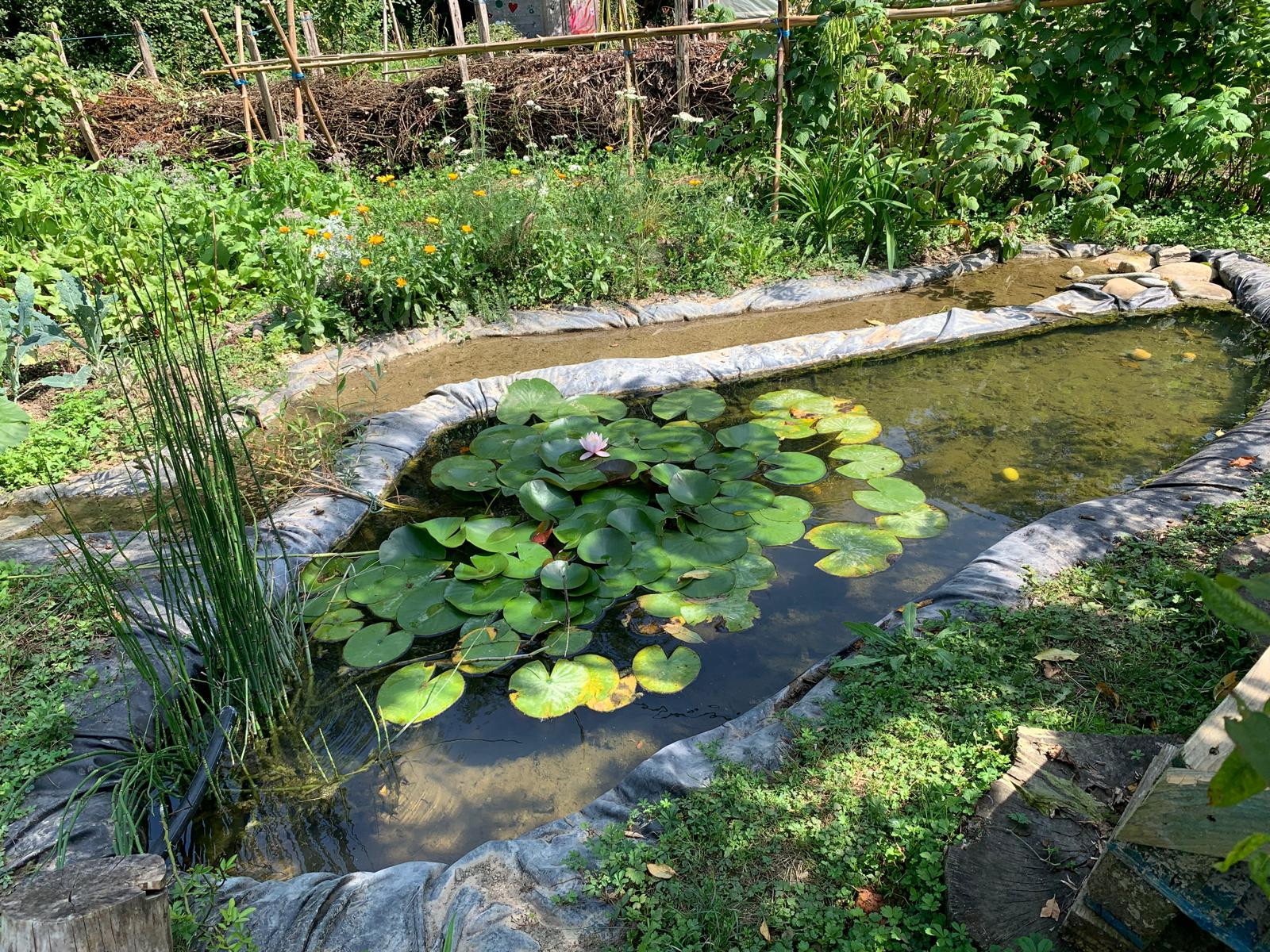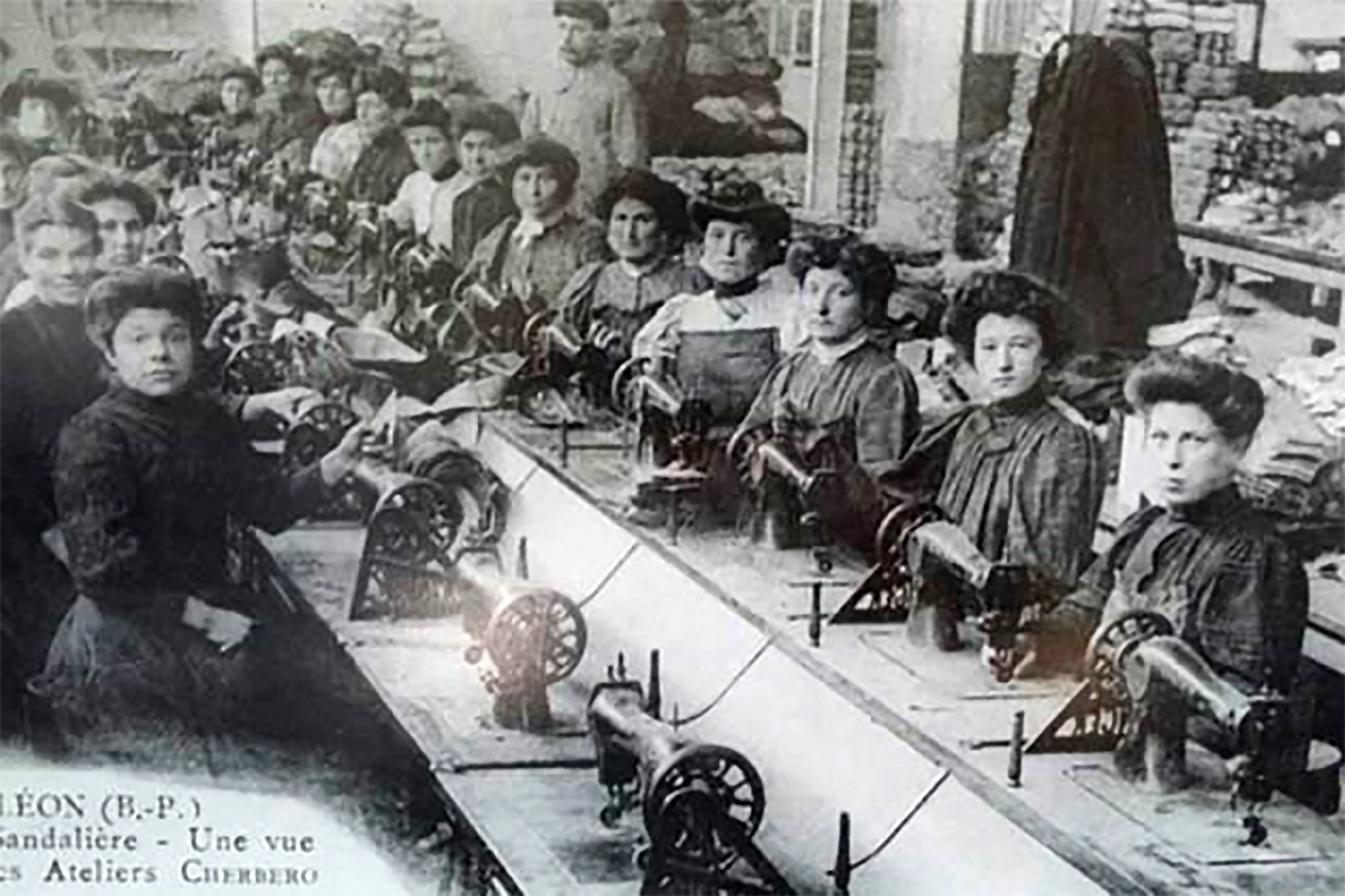"A few years ago, Santa Grazirat was Euskaldun at this point."
- It is the book of Txomin Peillen, Animismua Zuberoan (Haranburu, 1983). Their stories have brought us to Urdatx or Santa Grazi. Among others, the stories of the last deceased bear, as in this case it is not a story. In the inn of the people they ask us, they teach us a picture that testifies to the history of the bear and they tell us: “This picture is made by me!” Moreover, Anbroshi teaches us another copy of the photo...
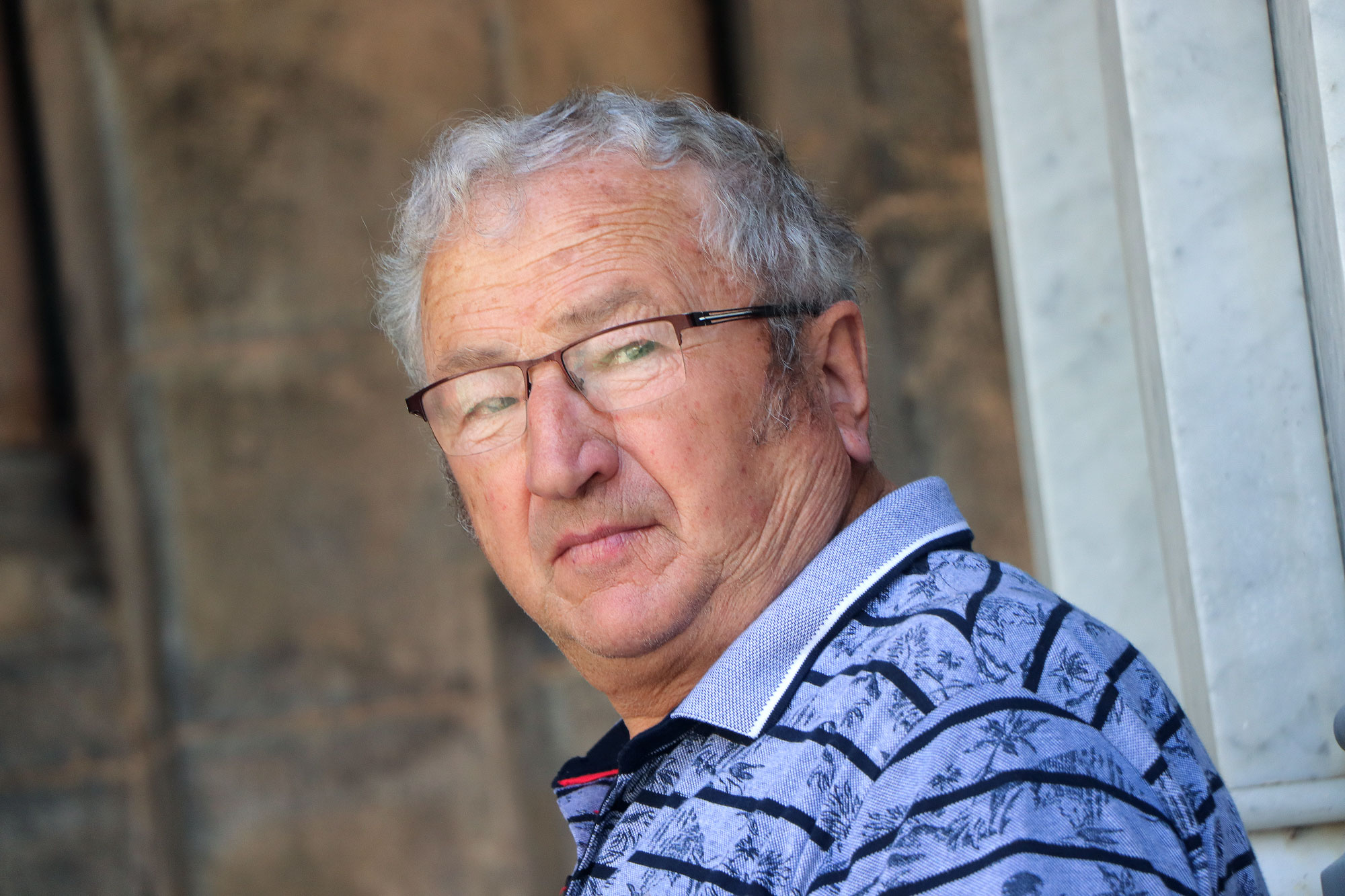
Anbroxi Burguburu Irigarai (Urdatx-Santa grazi, 1946)
Farmer has the advantage of having lived all his life in the village in which he was born: he has seen the world at first sight and has lived the world. You can tell us the past and the present. In addition to clean tap water, Anbroshi has spring water. Father of the house Elixaltia of the Xenta district, mother of Aroztegi de Kalla. In 1967 – in 1968, according to Itxaro Borda –, anonymous author of the photograph of the dead bear. And others.
Are you the one who made the photo? 1959...
Yes, I already have another one that is me! It's hanging from the wall of your house. However, Peillen wrote 1959, but I was 13 years old. He was still a boy! That photograph is made in 1967, and I'm sure, in particular, that in that portrait I'm wearing the army pants. And I guess the day was September 5th, because then the joint would open. Otherwise, it was not lawful to remove the weapons. We killed the bear, but it wasn't free or death. Two years earlier, yes, I was free. We made a shake, wanting to kill the bear, but we didn't capture the animal, and so we couldn't kill it. But the bear was always there in the village, and he had killed several sheep to his shepherd, and not a few.
But, as you said, killing a bear was not free...
It was not free, it was not like that, but the forest guard arrived and said that the dogs killed the sheep, that there were no bears. But the pastor said no. He knew it! “You’ll see there isn’t a dog, but there is a bear,” as the forest guard said. And there was a shake and the bear was killed. You got it in that picture. Johañe Goien threw that bear.
The shake “did,” “killed him... but you were there too!
Yeah, it's true, I was there too. The pastor knew he was a bear, he was sure, and the sheep were also dead. So when the junk opened, we brought our friends together. I don't even know how we called them, because then the phone was nothing, but at least we met our friends. Four of those friends are in the picture, maybe there's another or two. However, there were not many, many of us. Johañe Goien knew where the bear was and said, “I will go there and if I fail, you will find it on that other side.” And so on. But Johañe didn't fail. Pun! Pun! He shot and killed the bear. On the other hand, when the forest ranger arrived, Johañe said: “This is your dog!” Ha ha ha!
The forest guard wouldn't be happy...
No, I wasn't happy, and I wanted to torture us, to punish us. But when the bear died, the mayor was with us! And Johañe [Goien] was also a counselor in the village! In that potret are Jean-Pierre Antxoldi, who signed Vidalaine, and Jean Xutahandi... Among them, the matter had been dragged, and no one had been the victim of the curse. Now it would no longer be possible to kill the bear, nor to get rid of it without punishment! Now we would have a jail! As for the bear, in the current month [agorrila] the bear has 40 sheep dead in Echon [Huesca]. He killed some and brought others down. And in the Stone of St. Martin, he's also three months old, and he lacks ten.
In addition, you are sure of the day you killed the bear.
That year was when I got home from the army. I arrived at the age of 20 and left the army! First I was in Pau for six months, and then in the center of France, in the department of Creus, in La Courtine [Occitania]. The war in Algeria (1954-62) ended, hence our leaders. We didn't want to, but things were like that! I spent sixteen months there and got rid of the army. That year we killed the bear...
What did he learn in the army?
I respect it, we must respect it. Now young people don't have that. There was respect and shame too! If not, I was in jail! Once, for a while, you were in jail. I was on vacation and it wasn't early enough to come to where I had to go. I came late, and yet, to the pit. You had to have been there a bit.
Otherwise, have you made life here?
Yes, all life here, in this same house [Elixaltia] and always working. When we were kids, here was work. We were doing a little bit of a ball, though. We were a lot of friends in the village, a lot of friends. In all the families there were two or three children. Or more. We were in school, we were 30 children! Now there is no school here, but then yes, in the Xenta [Santa Grazi neighborhood] and in the Kasernan [next door neighborhood]. There were 60 children at the barracks! There were then two schools in Santa Grazi!
Today, how many children are there in the village?
Five or six children... There are few farmers here, the young people have gone from here to there to work, but they also come back. You want it here. Now, young people work not far away. Most of them are in Zuberoa. There are workshops in Atharratze, Maule, Oloro -- and here are the young people. They used to go to Paris or Bordeaux ... Our ancestors were heading for America! My uncles, brothers of my father, went to Argentina! From there the army moved to Paris. There wasn't much to do here, and people here went to Paris. Not now. Two years ago, or more or less, that people have work, whether it's technical, whether it's banking ... In Oloro there's the aerospace industry, there's a hospital, and people can learn and work there. There are also some here. Not much, but they are.
Going back to your time, what was the school like? And the udder?
It was a broom! When we were in school, it wasn't free to speak in Basque, to speak! Outside school, we talked in Basque, but inside school we didn't. There was a small role to play by the one I spoke in Basque. And if it was Saturday night, it was a curse. Je ne parlerai pas en Basque, ce mon devoir should have copied 50 times. “I will not speak Basque, it is my obligation.” And surely I have also complied with the punishment! And my older brother too. He was four years older than me, but for him the puncture was the same. Then he went to school, studied and got into the bench in Hazparne.
And you went to school?
Yes. It was a town school from 5 to 14 years old. At the age of 14, I went to school with the Maule Labrador School and with the certification of the studies. Bixta Eder. There I met the Basque udders. They were cures and pelotaris even with the fountain! There I met Xarrito, and another, Oroi naiz, Etxeberria... It was then that the Basque started to accelerate a little. Then ETA also started. There was a rapid movement, and there were also many priests. Roger Idiart, Junes Casenave. One was [Idiart] faster; the other was [Casenave] quieter. But the two were truly Basque... I did three years [1960-63] at Berrogaine-Larüntze College in Maule, where I studied agriculture. Then I worked at home.
What about smuggling here?
But here the smuggling was little! Wine, a little Ricard, a moscatel... That was the smuggling here! She was taken from Isaba to Belagua, and we took her back. On the back, on horseback, on donkeys... There was also wine here, and Ricard, but expensive! Three pints made the price of one here! The smuggling we were doing at night. We separated from there and spent four or five hours on the road. So we used to do the second one, in three days, until later. At the time of our parents, they were smuggling rum. I didn't know rum. They brought rum into the bladder. Do you know what an odre is?... There were about twenty-two liters of bran.
Do you refer to the time before or after that of the army departure?
Before I left, I did a little bit before I was 20. Then too, but I said, our smuggling was little, a lot of people did! I couldn't go to life. It is true that there were also real smugglers. They traversed horses and sheep from one side to the other. And in times of war -- and I'm sure people were going through.
I think I read Junes [Casenave] that here too the Jews, from Santa Gracia to Navarra...
This can happen in 1945, before it is born! But I've met the people who have done that work, the passeurs. Then the smuggling is over... I don't know if it's ever finished! Ha ha ha! There are always horses and sheep or... But wine had been consumed for a long time. Before, in the Stone of St. Martin, there was customs and the duaniers took the burden off you. One or two bottles were allowed, free, but nothing more than her.
You're collecting animal skins...
Marta de Alba [Marta]. I didn't have martha, I didn't know her. My ancestors did. My father, yes. The skin was expensive, of course. Sell the martha and buy with your reward the pants and pants! So I heard them say they were old. There are no martha junks anymore; you don't have to make money, prefect. There are always wild boar, gown and other things like that, but only to eat with friends.
Anbroxi Burguburu Irigarai, founded in 1946 in Urdatx, farmer, hotel owner...
Urdatx is the old name of our people. I have not known that name. When the saint entered, Urdatx took his name, and this is Santa Grazi for a long time. I've been a farmer all my life, I'm still a farmer, but because it was our little crop, I made the refuge to enter tourism, because there were many tourists coming in. Now there are also people, but a few years ago the Euskaldunes were already here. Euskaldun has fallen considerably. Before they came more [the Basques], for Easter. They came from Gipuzkoa, Bizkaia, Navarra... We, for a year, a holy week, had taken refuge in everything! That has been greatly reduced. Without the Basques there are Spaniards, Catalans, Galicians, some from Madrid, and so on.
* * * * * * *
Adrenaline
“[The bear was free to die] The labrador of Santa Grazi Jean Xutahandi-Elgoibar. In 1968, he threw a shotgun at the animal that crossed in a ravine area between the foxes of Kakueta and Ehüjarre. Also this unnamed bear found face to face on the path of Artzpasia. At the moment, killing bears was an illegal activity in France. Hunters knew they could have fat penalties, but the force of the atavic adrenaline that poured into the veins of this type of hunting was greater.” (Itxaro Borda, Shadow of the Bear in the Pyrenees, idazleak.eus).
Maddi Hardoi
“Yes, I’ve met Maddi Hardoi. She was a discreet woman. I didn't speak much, quiet. In the book [Animism in Zuberoa] I've seen that he interviewed Peillen, who told old stories, and so on. But, if not, Maddi didn't leave the house too much Ñañe. He was her husband of the old Hardoi, but he was born in the house Xanbra.”
Single farmer
“From here was Junes Xuburu, from Iriarte’s House, a smart singer. And faster is the Askazi Bordaleku of Junes! From here, Junes Casenave, from the Harigile house, in the Kalla poster, great pastoral. Here lived for a while Txomin Peillen, in the house Ibarburu, writer... You have a reputation! Anbroxi no, Anbroxi is a simple labrador who has lived here.”
LAST WORD
Santa Grazi, in
1960 there were 600 inhabitants in Santa Grazi. In 2021, it wasn't 200. In Burgui, in the central district of the town, twenty peasants, twenty rural houses, five accommodations... and twenty-four secondary dwellings, of which those of Bordeaux or Landas are the most important owners.
Zuberoako ohiturei buruzko bi liburu ditut gogoan. Batek XX. mendean aritu izan diren 180 dantzari eta soinulari aipatzen ditu. Haien artean, emakumezkorik ez da agertzen. Besteak, pastoralei egiten die errepasoa eta hor emakumeak aipatu aipatzen dira, baina omisio esanguratsuak... [+]
Martxoak 8an egindako pintaketak gainetik margotu dituzte ikur faxistekin Zuberoako hiriburuan. Horren aurrean elkarretaratzera deitu dute, astelehenean.
Zubiak eraiki Xiberoa eta Boliviaren artean. Badu jadanik 16 urte Boliviaren aldeko elkartea sortu zela Xiberoan. Azken urteetan, La Paz hiriko El Alto auzoko eskola bat, emazteen etxe baten sortzea, dendarien dinamikak edota tokiko irrati bat sustengatu dituzte.
I have recently worked in class on Etxahun Barkox’s beautiful and touching cobla. The bad guy! The afflictions of the house began because of the creation of the “praube with beauty”, but in seventeen years she had entered the sea of misfortune, having to abandon the girl... [+]
Maule, 1892. Eight women from the Salazar Valley headed home from the capital of Zuberoa, but on the way, in Larrain, they were shocked by the snow and all were killed by the cold. Of the eight, seven names have come: Felicia Juanko, Felipce Landa, Dolores Arbe, Justa Larrea,... [+]
XIX. mendearen bukaeratik Lehen Mundu Gerrara arte xiberotarrek gutun bidez ukandako komunikazioa ikertu du Elorri Arkotxak Nafarroako Unibertsitate Publikoan eginiko tesian.
Espartingileek ez dute nahi beste saldu uztailean eta ekainean. Turismoak beheiti egin du uda honetan Ipar Euskal Herrian eta supermerkatuek espartina gutxiago manatu dituzte.









